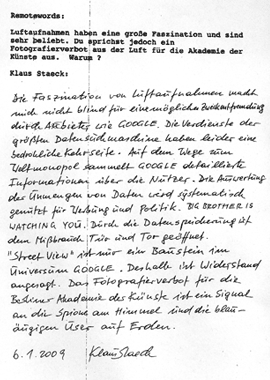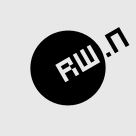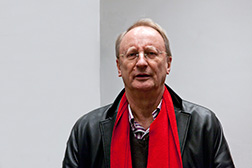Artist, president of Akademie der Künste (Academy of Arts) Berlin 2006 – 2015
www.staeck.com
RW.5 OFF LIMITS FOR GOOGLE
Instaled: 16-12-2008
Location | GPS: Akademie der Künste, Berlin, Germany | 52.515353,13.3803765
Author: Klaus Staeck, Academy President since 2006
Roof Size | Font Size: 330 qm | 44m x 7,5m
On Air: Apple Maps 2-2013, Bing Maps 1-2014, AeroWest 7-2010
Off limits for google
Interview: Klaus Staeck, ADK Berlin 2009

REMOTEWORDS: Aerial views are hugely fascinating and very popular. You talk of forbidding photographs of the Academy of Arts to be taken from the air. Why?
Klaus Staeck: The fascination of aerial views doesn’t blind me to their possible misappropriation by providers like Google. The services offered by big search engines have an unfortunate downside. On its way to becoming a world monopoly, Google collects detailed information on its users. The evaluation of this vast amount of data is systematically deployed for advertising and politics. Big Brother is watching you. Data storage opens the floodgates to misuse. “Street view” is only one building block in the Google universe. Which is why resistance is called for. Banning photographs of the Berlin Academy of Arts is a signal to the spies in the sky and to their naïve users on earth.
REMOTEWORDS: Interestingly enough, you ban something when you know very well it only makes limited sense, since you can’t forbid Google. You thus call attention to the legal vacuum that has arisen from this new technology and proceed, based on the motto: “Google didn’t ask us and we don’t ask Google.” In addition, the action also represents a certain paradox: it is through the medium of Google Earth that your message is broadcast and thus perceptible. At the same time, your message negates the medium. How do you explain that?
Klaus Staeck: It is not about a ban, but about self-protection, about keeping yourself safe from unauthorized intervention. It’s about defending public space. Because what GOOGLE practices with Street View is the private and, in the end, the commercial appropriation of whole cities and landscapes without at the very least asking whether those concerned also consent to it. My action is a kind of self-defense against all too greedy data vultures. It is aimed at GOOGLE and at all its naïve users unaware of the danger. And also I don’t need GOOGLE to broadcast my message. It’s enough if the Academy’s neighbors can see my message to GOOGLE and that a photo taken of the action is broadcast by other media.
REMOTEWORDS: For REMOTEWORDS your message is not unproblematic, since we are sitting between two stools here. If Google would boycott our project because of your action, we would be robbed of “paper and pencil”, since we use exactly the program being criticized as our artistic medium. What do you think will happen now? Will Google censure the message at its prominent place directly next to the Brandenburg Gate as it must do, for instance, for military facilities? Or will the company prove to be a good democrat via its company slogan “Don’t be evil!” and allow free speech, even as self-criticism?
Klaus Staeck: With my artistic-political work I have, since day one, sat between all possible stools. That’s all part of this form of artistic intervention. GOOGLE will of course continue its program. Let’s wait and see how the company reacts. Even the most success-indulged company has to expect that people and institutions defend themselves when their rights are intruded on. And data protection is quite simply a major civil right. There are already communities that have defended themselves on legal grounds from Street View’s spy in the sky. Since when does GOOGLE have to “prove itself to be a good democrat and allow free speech even as self-criticism”? Civil rights do not rely on good will but are valid for everyone and do not need permission.
REMOTEWORDS: Many thanks for this interview.

REMOTEWORDS: Luftaufnahmen haben eine große Faszination und sind sehr beliebt. Du sprichst jedoch ein Fotografierverbot aus der Luft für die Akademie der Künste aus. Warum ?
Klaus Staeck: Die Faszination von Luftbildaufnahmen macht mich nicht blind für eine mögliche Zweckentfremdung durch Anbieter wie Google. Die Verdienste der größten Suchmaschine haben leider eine bedrohliche Kehrseite. Auf dem Weg zum Weltmonopol sammelt Google detaillierte Informationen über die Nutzer. Die Auswertung der Unmengen von Daten wird systematisch genutzt für Werbung und Politik. Bog Brother is watching you. Durch die Datenspeicherung ist Missbrauch Tür und Tor geöffnet. “Street View” ist nur ein Baustein im Universum Google. Deshalb ist Widerstand angesagt. Das Fotografierverbot für die Berliner Akademie der Künste ist ein Signal an die Spione am Himmel und die blauäugigen User auf Erden.
REMOTEWORDS: Interessanterweise sprichst Du ein Verbot aus, von dem Du genau weißt, dass es nur bedingt Sinn macht, denn Google lässt sich nicht verbieten. Du machst damit auf den rechtsfreien Raum aufmerksam, der durch diese neue Technik entstanden ist und verfährst frei nach dem Motto: “Google hat uns nicht gefragt und wir fragen Google nicht.” Darüber hinaus stellt die Aktion aber auch ein gewisses Paradoxon dar: Erst durch das Medium Google Earth wird deine Botschaft verbreitet und damit erfahrbar. Gleichzeitig negiert deine Message das Medium. Wie erklärt sich dies?
Klaus Staeck: Es geht nicht um ein Verbot, sondern um Selbstschutz, um den Schutz gegen unberechtigte Eingriffe. Es geht auch um die Verteidigung des öffentlichen Raumes. Denn was GOOGLE mit Street View praktiziert ist die private und schließlich kommerzielle Inbesitznahme ganzer Städte und Landschaften ohne wenigstens gefragt zu haben, ob die davon Betroffenen damit auch einverstanden sind. Meine Aktion ist eine Art Notwehr gegen den all zu gefräßigen Datenkraken. Sie richtet sich an GOOGLE und an all die naiven User ohne jedes Gefahrenbewusstsein. Ich brauche auch GOOGLE nicht für die Verbreitung meiner Botschaft. Es genügt, dass die Nachbarn der Akademie die Nachricht an GOOGLE sehen können und dass ein selbst erstelltes Foto von der Aktion über andere Medien verbreitet wird.
REMOTEWORDS: Für REMOTEWORDS ist deine Botschaft nicht unproblematisch, denn wir sitzen zwischen zwei Stühlen. Würde Google unser Projekt auf Grund der Aktion boykottieren, wären uns “Stift und Papier” genommen, denn wir benutzen ja gerade jenes Programm, welches hier kritisiert wird als künstlerisches Medium. Was wird deiner Meinung nach geschehen? Wird Google die Botschaft an prominentem Ort, direkt neben dem Brandenburger Tor zensieren, so wie dies z.b. bei militärischen Anlagen geschehen muss? Oder wird sich der Konzern mit dem Firmenmotto “Don’t be evil!” als guter Demokrat erweisen und die freie Meinungsäußerung, auch als Selbstkritik, zulassen?
Klaus Staeck: Ich sitze mit meiner künstlerisch-politischen Arbeit seit jeher zwischen allen möglichen Stühlen. Das gehört zu dieser Form künstlerischer Einmischung. GOOGLE wird natürlich sein Programm weiter fahren. Warten wir ab, wie sich die Firma verhalten wird. Auch der erfolgverwöhnteste Konzern muss damit rechnen, dass sich Leute und Institutionen wehren, wenn in ihre Rechte eingegriffen wird. Und der Datenschutz ist nun einmal ein wichtiges Freiheitsrecht. Es gibt bereits Gemeinden, die sich juristisch gegen die Himmelsspione von Street View zur Wehr setzen. Seit wann muss sich eigentlich GOOGLE erst “als guter Demokrat erweisen und die freie Meinungsäußerung, auch als Selbstkritik, zulassen?” Freiheitsrechte sind keine Gnadenrechte, gelten für alle und bedürfen keiner Zulassung.
REMOTEWORDS: Vielen Dank für das Gespräch.

